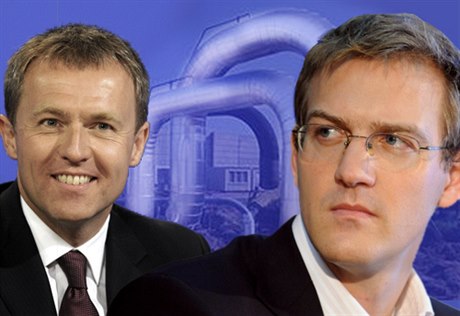Czech state-controlled power major ČEZ announced last week it will take ownership of heat producer Energotrans from Energetický a Průmyslový Holding (EPH), which will acquire ČEZ’s 50-percent stake in German coal miner Mibrag, but the financial details of the deal were not disclosed. EPH, owned by PPF Group and J&T (40 percent each) and Daniel Křetínský (20 percent), already possessed half of Mibrag. EPH and ČEZ together bought Mibrag two years ago for just under Kč 11 billion.
But initially when EPH formed an alliance with ČEZ, it was supposed to take control of the ČEZ-owned 800 MW heat and power plant in Chvaletice, east Bohemia. So why did the deal that was announced to the public not take place? Does it signal a shift in relations between ČEZ and EPH?
Problem with Chvaletice
EPH boss Daniel Křetínský managed to establish especially good relations with ČEZ when he was the manager of J&T Bank. And as the top man at EPH, the deals he has sealed with ČEZ appear to be most advantageous for Křetínský’s company.
The Chvaletice deal was not about the actual coal-fired plant — which due to emissions permits has only four years of operation left — but deliveries of lignite by ČEZ to Chvaletice, which the power giant was to include in the deal. Who would buy a coal-fired heat and power plant without secured supplies when there is a shortage of coal on the market and prices are rising?
In business circles there was talk that under the deal EPH was to receive a contract for lignite supplies from the ČEZ-owned mining company Severočeské doly not for four years, but for 15 years. However, the director of Severočeské doly, Jan Demjanovič, reportedly refused to sign such a contract unless he received a written order to do so from the mining company’s sole shareholder, ČEZ.
Could ČEZ commit to giving a long-term supply contract for its own coal when — because of a dispute with Pavel Tykač’s Czech Coal — the power producer is not assured of supplies for its own power plants beyond 2012? How would ČEZ explain it to its shareholders, all the more so if it sold its own coal to Křetínský cheaper than it pays for supplies from Czech Coal?
The decision by ČEZ to abandon the deal is logical and correct. At the same time, Křetínský is understandably dismayed. “He was very put out and considers he was double-crossed, but two reasons emerged why the deal couldn’t go ahead. First of all, we couldn’t agree on price, and secondly strong pressure grew for us not to sell coal outside the [ČEZ] group,” a ČEZ manager who chose to remain anonymous, told Czech Position.
High political risk in Germany
When EPH and ČEZ together purchased Mibrag, they committed to provide priority purchase rights to the other partner in the event one of them decided to sell their half. Transporting lignite from the Mibrag coal field in Germany to the Czech Republic doesn’t make a lot of economic sense, thus ČEZ planned to build a power station next to the Mibrag mine in Saxony.
However, given the growing influence of the Greens in German politics — combined with the government’s plan to phase out all coal and nuclear power plants in the country — ČEZ concluded that the political risks were too high to go ahead with the Mibrag power plant project.
Two years ago, Germany’s RWE had to abandon plans to build a coal-fired power plant in Ensdorf in the Saarland, as did EnBW, which was preparing to build a coal power plant near Mannheim. In the last four years, over 10 coal-fired generator blocks in the planning have been abandoned. The last such case was in Datteln in the state of North Rhine-Westphalia, where E.ON had begun building a plant with a projected total cost of €1.2 billion. Some €900 million had already been spent on planning and building a 180-meter cooling tower, boiler rooms, and number of support buildings when environmentalists won a court injunction halting the construction.
Therefore, it is very possible that ČEZ’s plans for a coal-fired power plant in Profen next to the Mibrag mine would meet a similar fate.
Whether or not ČEZ stands to make a profit from selling its stake in Mibrag as the company claimed in the press release announcing the sale, the deal is very sensible not only because of the political circumstances in Germany: It is a clever move in terms of relations with EPH. When ČEZ withdrew from the deal to sell Chvaletice to EPH along with a long-term guaranteed supply of coal, Křetínský reportedly insisted that ČEZ sell EPH some other energy assets. The abandonment of the Mibrag project could be interpreted as an amicable “business divorce” between the two companies, which is to ČEZ’s advantage.
Significant price difference
The acquisition of Energotrans, which generates heat in the town of Mělník, about 30 km north of Prague, and delivers it to the Czech capital, strategically at least is a right decision by the ČEZ management: The company comes with a 20-year contract with the Prague administration to supply heat to households and public buildings. Unlike electricity sold on the open market, which is subject to considerable price fluctuations, the 20-year contract contains fixed prices, and thus will guarantee a predictable and reliable income for ČEZ. The only question is how much ČEZ will pay for Energotrans. According to Czech Position’s information, ČEZ will pay Kč 14.5 bln for Energotrans; ČEZ will pay seven times the price for the shares at which it sold them.
In last week’s press release ČEZ states “no further details of the transaction will be made public.” Nevertheless, according to Czech Position’s information the state-controlled power major will pay Kč 14.5 billion for Energotrans, minus Kč 2 billion which the company will receive in the form of dividends paid in advance.
But 10 years ago ČEZ owned a 30-percent stake in Energotrans, which it sold to Pražská teplárenská for around Kč 500,000. Later EPH, which also owns Pražská teplárenská, acquired Energotrans. Thus ČEZ is now buying back Energotrans shares for seven times the price it sold them for. So did ČEZ sell the shares underpriced 10 years ago, or is the price it is now paying for the same shares overinflated? If the latter is the case, the transaction may also be intended to placate Křetínský and EPH.
“Over these years, there have been fundamental changes to Energotrans’ business, obviously also as a result of the changes in the price of heat. The company made a net profit of Kč 1.2 billion in 2010. It’s also a factor that 10 years ago we were selling a minority stake, whereas now we’re buying the whole company,” ČEZ spokesman Ladislav Kříž told Czech Position in the way of an explanation.





